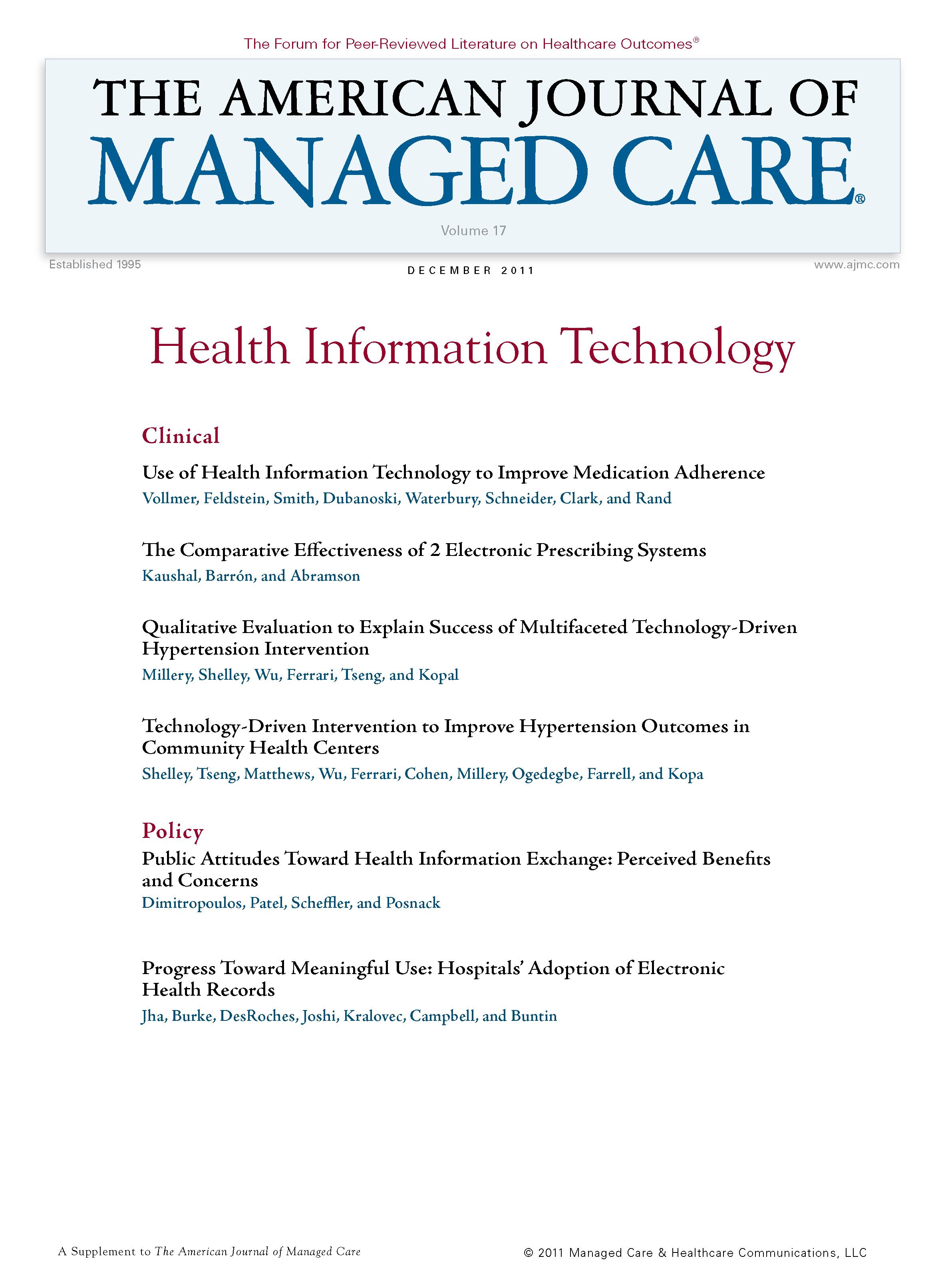- Center on Health Equity & Access
- Clinical
- Health Care Cost
- Health Care Delivery
- Insurance
- Policy
- Technology
- Value-Based Care
Meaningful Use of Health Information Technology: Evidence Suggests Benefits and Challenges Lie Ahead
The authors discuss the wide-reaching impact of legislation spurring the adoption of health information technology and provide an overview of the content found in this special issue.
Less than 3 years into the passage of the Health Information Technology for Economic and Clinical Health (HITECH) provisions of the American Recovery and Reinvestment Act of 2009, measurable results are emerging. For example, in the first 11 months during which healthcare providers (“eligible professionals”) and acute care hospitals (“eligible hospitals”) had the opportunity to demonstrate stage 1 “Meaningful Use” of Healthcare Information Technology (HIT), more than 20,000 “eligible professionals” and 750 “eligible hospitals” have done so. In the current issue of The American Journal of Managed Care, we showcase examples of HITECH’s potential impact, as well as illustrate the opportunities and challenges ahead.
Two studies in this issue illustrate how HIT can improve the capacity of our healthcare system to manage chronic illnesses. The study by Vollmer et al describes how an interactive voice recognition system can improve adherence to inhaled corticosteroids among individuals with asthma in a large health maintenance organization. Shelley’s study shows that the combination of electronic medical records, clinical decision support, and performance feedback can improve the rate of blood pressure control in patients with hypertension who receive care in community health centers. Together, these studies provide hope that the nation’s investment in HIT could one day yield clinical dividends.
Three other studies in this issue suggest that success for HIT will require attention to both technological and sociological factors. The study by Millery et al attributes the success of an HIT-based intervention to a multi-faceted approach that involves a combination of decision support tools, systematic provider feedback, implementation support, and leadership. Results from Abramson’s study suggest that the full error-reduction potential of e-prescribing may only be reached with the combination of on-line clinical decision support and support for clinicians. The study by Dimitropoulos et al further illustrates that a broad spectrum of healthcare consumers needs to be engaged to allay their privacy and security concerns about Health Information Exchange.
To be sure, the challenges that lie ahead remain formidable. The survey results reported by Jha et al warn us that in spite of the broad-based enthusiasm for the HITECH program among US hospitals, certain required functionalities remain challenging to implement. Attainment of the HITECH objectives is by no means certain. The HITECH legislation represents a once-in-a-generation opportunity to deploy tools that could address many of the problems underlying the US healthcare system. While the healthcare community appears to be making good progress toward making these tools available to clinicians, these tools will mean little unless we leverage them to redesign healthcare to be safe, effective, patient-centered, timely, efficient, and equitable.
Author Affiliations: From Office of Economic Analysis, Evaluation and Modeling, Office of the National Coordinator for Health IT, Department of Health and Human Services (MFF), Washington, DC; Brigham and Women’s Hospital (EP), Harvard Medical School, Boston, MA.
Address correspondence to: Michael F. Furukawa, PhD, Acting Director, Office of Economic Analysis, Evaluation and Modeling, Office of the National Coordinator for Health IT, Department of Health and Human Services, 200 Independence Ave, SW, Washington, DC 20201. E-mail: Michael.Furukawa@hhs.gov.

Quality of Life: The Pending Outcome in Idiopathic Pulmonary Fibrosis
February 6th 2026Because evidence gaps in idiopathic pulmonary fibrosis research hinder demonstration of antifibrotic therapies’ impact on patient quality of life (QOL), integrating validated health-related QOL measures into trials is urgently needed.
Read More
